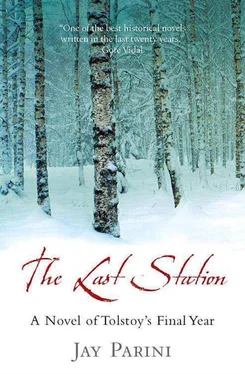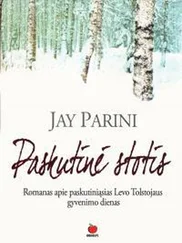That afternoon, Lyovochka decided to prove his manliness by resuming gymnastics. As a young man, he would hang upside down from a bar in his study, terrifying the servants. ‘It brings blood to the brain,’ he used to say. Now he attempted to hang upside down from a wardrobe, which has some iron hooks that fit his bootheels. But his weight, of course, brought the whole thing down on top of him.
‘You’re like a child,’ I told him. ‘You can’t be trusted.’
Furious more with himself than with me, he locked his study door until dinner. At seven, he came down and ate in silence.
It is almost November, and I am sad. The weather grows worse every day: windy and cold, with rain like pellets, sometimes a dust of snow. I walk in the woods each morning with my dogs, Marquis and Belka. We follow the same ruts in Zasyeka Wood that Lyovochka uses when he goes riding in the afternoons. I can’t believe he still insists on riding. At least he is willing to let Dushan Makovitsky ride behind him. A few days ago he took a frightful spill, and came home covered with black mud. But I said nothing about the incident. It would only have upset him.
Miss Natalya Alexevna Almedingen arrived yesterday. An elegant woman, she edits a magazine and writes popular books for children. Quietly, she has been talking to me about the deal with Prozveshenye (whom she apparently represents). They are desperate to get Lyovochka’s copyright. If I can induce him to sign a statement, even a tentative, noncommittal statement, this will be useful. I must stop Chertkov while there is time.
We have other visitors, as usual. There is the talkative Gastev, who comes full of gossip, and Lyovochka takes it in quite eagerly. Tanya is here again. And Sergey, who plays chess with his father twice a day. I wonder how I tolerate these crowds.
Everything has been going well for a little bit, so I was saddened when I discovered that Bulgakov had taken a letter to Telyatinki this morning. Sasha made a note of this, and I found the note on her desk in the Remington room.
‘Who was the letter for?’ I asked her.
‘Galya,’ she said.
Why was my husband writing to Chertkov’s wife? I went straight to his study to ask him.
‘You sent a letter to Galya Chertkova this morning,’ I said.
‘Perhaps I did. It should not concern you.’ He hunched over his desk, continuing to work.
‘What was it about?’
‘I forget,’ he said. ‘Old men forget things.’
‘Please, darling. You needn’t treat me like a child.’
‘I simply don’t recall what was in that letter.’
‘You’re lying to me.’
He squirmed in his chair. I had him now!
‘Let me see a copy of that letter,’ I said.
‘Never!’ He stood up, looking like Jove himself, his fists full of lightning. He would have struck me dead if he could have.
‘There was a time when you would never have screamed like that,’ I said. ‘A time when you loved me.’
He withered into his chair. I saw before me an old, sick man – the ghost of the man I love, that I have loved more than life itself, for nearly fifty years. Why doesn’t he know this? Why can’t he feel the presence of my love?
‘I wish you would leave me alone,’ he said. ‘I want to be alone.’
‘You are alone, Lyovochka. We are both alone. We have been alone for some time.’
‘I must go away.’
‘You have already gone,’ I said. ‘I live alone here.’
I left in control, but as soon as I stepped outside the study I had to brace myself by leaning with my back to the wall. My legs could barely hold me. My life could barely hold me.
‘Lyovochka,’ I said, muttering into my fingers. I shook all over. I waited for his hand to touch my shoulder. For his big shadow to loom, to cover me as night covers the fields. To be led to my bed, to be held, to be loved.
But he never came.
He will never come again.
Last night I slept in my little room at Telyatinki, which always reminds me of Masha. I see her in every object in the room, feel her presence. I want her beside me, touching me. I read and reread her letters, and I feel guilty. It is all wrong to have come to Yasnaya Polyana to work with Tolstoy but to find myself dwelling compulsively on my relations with a woman.
This separation, though painful, has made me vividly aware of my need for her. I can see the world more freshly through her eyes. Everything that happens to me takes on a delicious tint because of her.
Lately, I have found myself in greater sympathy with the Tolstoyans, partly because it is so difficult to remain intimate with Sofya Andreyevna. She has grown testy and suspicious, more so than ever.
Chertkov floats on air nowadays, smelling victory. Even so, his brittle relations with Sofya Andreyevna worry him, since they prevent easy access to Leo Nikolayevich; he talks incessantly about ‘mending fences’ with her so that he might spend more time with the Master before he dies.
I think Chertkov underestimates the intensity of her feelings about him. She does not merely dislike him. She loathes him.
This morning, shortly after breakfast, I was summoned to the dining room in Telyatinki. Chertkov was seated on a high stool, looking radiant. Like a bride before the wedding. The atmosphere in the room was prickly and tense.
I bowed to him, more emphatically than necessary.
‘There is news,’ he said. ‘Astonishing news, in fact.’
I felt my stomach muscles tighten.
Chertkov maintained a cool demeanor. ‘Leo Nikolayevich has left,’ he said. He plucked each word from space as if with tongs, laying them on a bone china plate. ‘He left this morning, with Dushan. Nobody knows where they have gone.’
This came like a death in the family after a protracted illness. In such cases, one regrets the loss but is also relieved.
‘Go to Sofya Andreyevna,’ Chertkov said. ‘Find out what you can, and report to me later in the day.’
I set out immediately for Yasnaya Polyana, arriving at about eleven; Sofya Andreyevna had only just awakened, having passed a sleepless night. Her eyes were puffy and red, her cheeks swollen, as if she had already been crying for several hours. But panic animated her now. She and Sasha and I converged, breathlessly, on the second-floor landing.
‘Where is he, Sasha?’ Sofya Andreyevna spoke with a rare intensity. ‘Where is Papa?’
‘He has left home.’
‘What do you mean, “left home”? When?’
‘Last night.’
‘This is impossible, Sasha!’
‘I’m telling you what happened, Mama. He is gone. I have no idea where. Nobody has.’
Sofya Andreyevna staggered backward, her mind a million leaves whirling in a dark wood. ‘He is gone,’ she repeated, testing the words.
‘Yes. He is gone,’ Sasha said.
‘Has he gone for good?’
‘I think so.’
‘Alone?’
‘With Dushan.’
Then she became solicitous. ‘Darling Sasha, now tell me. Where has your father gone? I’m sure you know. You mustn’t play games with me… not now.’
‘I have no idea where he went. He said nothing specific. But he gave me a letter.’ She handed the letter to her mother.
Sofya Andreyevna tore at the paper, holding her breath. She read it slowly, moving her lips:
My departure will grieve you. I am sorry about this, but please understand and believe I cannot do otherwise. My position in this house has become intolerable. Along with everything else, I can no longer abide these luxurious conditions. What I am now doing is what old people have commonly done – leave their worldly life behind to spend their last days in peace and solitude.
Please understand this and do not attempt to follow me, even if you discover my whereabouts. This would only worsen your position and mine. It would not change my decision.
Читать дальше












